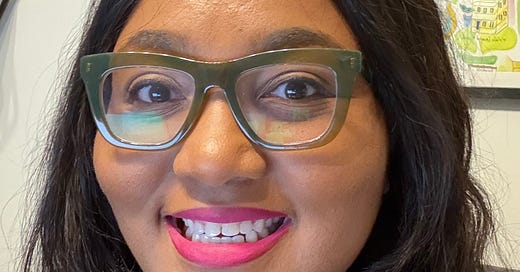A love letter to public health
Public health professionals are the utility players of society. We are flexible, adaptable players with the ability to contribute to the team in multiple ways.⚾️
In this newsletter, I share the powerful words of Serena A. McCovery MBA expressing her love for public health. Serena is a skilled and dedicated public health professional who lost her job in the recent funding cuts.
If you would like to follow Serena’s example by sharing a love letter to public health or reflecting on your career in public health, please get in touch!
A love letter to the utility players of society
by Serena A. McCovery, MBA
My transition into public health has been more than a career shift; it’s been a source of personal awakening. This field has reshaped how I see the world, revealing how public health is woven into the fabric of everyday life. Public health is invisible and omnipresent, from the warning labels on electric kettles to the ADA-compliant buildings we pass on our commute. But beyond policies and infrastructure, it’s taught me about belonging, collaboration, and the courage to lead with conviction and authenticity.
Public health is everywhere and for everyone
Public health doesn’t just live in clinics or government reports; it’s in the seatbelts we buckle, the cups that don’t spill in our cars, and the smoke detectors in our homes. It’s a field that quietly ensures our safety while demanding bold action from those who uphold it. Working across sectors, I’ve seen how public health intersects with education, business, and urban design, proving that progress requires breaking silos and embracing unlikely partnerships.
The leaders who inspire me
I’ve had the honor of working alongside courageous leaders, from frontline workers to policymakers, who face balancing what’s right with public skepticism. These people persist, not with arrogance but with empathy: educating, listening, and sometimes standing firm in the face of opposition to protect the greater good. Their grace under pressure has redefined my understanding of leadership.
Mission-driven world
As someone who entered public health without an MPH or prior experience in the field, my work has broadened my perspective on management and efficiency. It taught me that empowering individuals isn’t just about productivity; it’s about fostering purpose. I’ve witnessed teams thrive when people bring their whole, authentic selves to work, proving that passion fuels impact beyond spreadsheets.
What public health has taught me
Over time, I’ve learned that:
Public health looks out for everyone, especially the marginalized.
Public health is a community built on trust and collective action.
Public health experts share openly, lifting others rather than guarding knowledge.
Public health professionals never stop learning, whether from data or human stories.
Public health cultivates exceptional managers who lead with humility and vision.
Public health demands courage to advocate, innovate, and endure criticism.
Public health is the backbone of society, though rarely celebrated until crises strike.
Public health is teamwork, a dance of collaboration no textbook could capture.
Public health professionals are utility players. With the start of a new baseball season, I am reminded how they can adapt to whatever position the moment demands, from data analysts to policy advocates to crisis communicators.
But also:
Public health can also bring grief. Its dreams are deferred, policies are stalled, programs are underfunded, and potential is unrealized. Knowing the right solution and watching it gather dust on a desk can be frustrating. Yet, even in frustration, there’s fuel to keep going.
Closing reflection
Public health has humbled me, challenged me, and given me a lens to see the world as interconnected. It’s a field where small actions ripple outward, leadership means serving, and authenticity isn’t just welcomed but essential. To anyone considering this path: prepare to be transformed. You’ll leave with skills and a renewed belief in what people can achieve together.
This article was written as part of a partnership with the Region V Public Health Training Center.
Serena McCovery MBA is a baseball enthusiast with fifteen years of experience in public health, non-profit organizations, and higher education. She has dedicated her career to supporting students, workforce development, and leadership programs. Due to recent funding cuts, Serena is looking for her next role.
Action steps - a note from Katie
Thank you for reading this newsletter for and about the public health workforce. I’m still really not sure where we go from here. But each time that I publish this newsletter, I find more ideas for action. I will start to compile them here. As we learn more, let’s keep adding to this list.
Do Serena’s words above inspire you? Would you also like to write a love letter to public health? Or to reflect on your public health career? I would love to publish your words here. Get in touch.
Let’s communicate what public health is and why it matters that so many of us have been forced to leave our jobs. What is your proudest moment in public health? Complete this form to submit your public health story to be used for advocacy.
This newsletter is for and about the public health workforce. Subscribe for free to never miss an episode. If this newsletter has been valuable to you and you think that it should be available for free to others, please consider supporting it with a paid subscription.
Every little counts. If my perspective has been meaningful to you, please show appreciation for the efforts and experience that created it by buying me a coffee. ☕️
If you can’t support this newsletter with money at this time, support it with your words: please join me to continue the conversation in the comments here or in the Public Health Connections Lounge. How have you been affected by recent seismic changes to the public health workforce? How are you doing? What have you learned? Do you have any more wisdom to share? What questions would you like to ask about moving forward?
Share this Substack newsletter far and wide: Like ❤️ and restack this post if you believe in public health. Use Substack’s Recommendations feature to write a review of this newsletter. (Or teach me how to use Notes or Chat better?)
Do you have suggestions for how to leverage this newsletter and community to be a supportive resource to public health professionals at this time? Please get in touch.
Got something to say? I welcome hosting opinion pieces from my fellow public health professionals - get in touch to pitch me if you want to use this platform.
Got more ideas for action steps that should be on this list? You know the drill. Get in touch.
I close by emphasising what I said in a previous newsletter:
“At this time of uncertainty for the public health workforce, let’s remember our commitment to science and evidence and data. We know that validating emotions and baggage has a place too, but we need to be able to identify them and distinguish opinion from fact.
Let’s recommit to kindness and mutual support for the public health workforce and beyond. If leaders are trying to sow divisions among us, the best we can do is to respond with empathy, and by strengthening, connecting, and lifting up one another.
Right now, the best I can offer my fellow public health professionals is a place* to gather and reflect and share and vent and organize and ask questions and offer support to one another. We’re going to need that now more than ever.”
*This is a plug for the Public Health Connections Lounge on LinkedIn, where we seek to build community and conversation among public health professionals. Join us.
If you are new around here, Welcome to The Public Health Workforce is Not OK! In this newsletter, I share frank insights and start conversations about the experiences of building a public health career. You can get to know me here and here. Please subscribe, review the archive, and join the conversations in the Lounge. I am committed to keeping this newsletter free for job seekers (at least, for as long as I still have a job).







A late-2019 Angus Reid study found that over the previous year almost a quarter of Canadians decided against filling a prescription or having one renewed due to medication unaffordability. Resultantly, many low-income outpatients who cannot afford to fill their prescriptions end up back in the hospital system as a result, therefore costing far more for provincial and federal government health ministries than if the medication had been covered.
It's very expensive and morally wrong when an elected government will promise the people much-needed universal albeit-generic-brand medication coverage only to have the pharmaceutical industry typically react with successful threats to abandon their Canada-based R&D, etcetera, if the government goes ahead with the ‘pharmacare’ plan. While such universal medication coverage would negatively affect the industry’s superfluously plentiful profits, the profits would nonetheless remain great, just not as great.
Clearly, a truly universal healthcare system needs to be supported by a pharmacare plan. Instead, we continue to be the world’s sole nation that has universal healthcare (theoretically, anyway) but no similar blanket coverage of prescribed medication, however necessary. Ergo, in order for the industry to continue raking in huge profits, Canadians and their health, as both individual consumers and a taxpaying collective, must lose out big time.
Canadians are often envied abroad for our “universal” healthcare system; yet, in a significant way, we still come second to big industry's big-profit interests. I fear that our system will eventually include actual crucial treatments that, at least in a timely thus beneficial manner, are universally in-accessible, except for those with the money to access privately at for-big-profit prices.